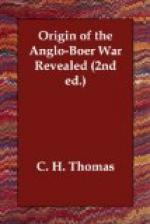The British authorities appeared at that time not to fully realize that that movement was rife with future dangers and complications to their own colonial interests, that it meant the creation of a nucleus of a people openly averse to the English, and who would independently carry out practices in near proximity, especially in dealing with aborigines, which would seriously compromise them and become a standing menace against peaceful expansion and civilization.
It was, on the other hand, anticipated that the movement could only end in disaster, the people being too few to make a successful stand against the numerous hostile Kaffir tribes. The Government, therefore, refrained from preventive measures, and confined its efforts to discouraging the emigration and to reconcile the malcontents. Those efforts, however, proved fruitless; the people held to their project with resolute fearlessness and self-confidence, and were even content to sacrifice their farms and homesteads, their sale being in some cases forbidden by special enactment.
The terms of “Boer” and “Boer nation” do not convey or mean anything disparaging, rather the contrary. Boer simply means farmer, as a rule the proprietor of a farm of about 3,000 to 10,000 acres, who combines stock-breeding with a variety of other farming enterprises as well, according to the soil and locality. As a national designation, the term “Boer” conveys the distinction from the recently arrived Dutchman, who is called “Hollander.” Hollanders, again, delight of late to claim the Boer nation as their kith and kin, but prefer to ignore the existence of the French Huguenot factor.
The great “trek,” with families and movables, as the emigration movement is called, occurred in 1836; some families started even before, and other contingents followed shortly afterwards. After many vicissitudes and nearly twenty years of wanderings, and a nomadic life attended with untold hardships and dangers, intermittent conflicts with native tribes, and at times also contests with British forces, they were eventually permitted, under treaty with England, to settle down and to constitute the independent Orange Free State and Transvaal Republics. That was in 1854 and 1852 respectively.
But, until then, progress in the British colonies and peaceful relations with the several Kaffir nations had at times been sadly impeded by the aggressive native policy pursued by the Boers after the pattern adopted from the previous Dutch regime, which admitted of slavery, whilst English law had abolished and forbade that practice as contrary to a soundly moral method of civilizing natives and inimical to prosperous and peaceable colonial progress. Broils and wars between Boers and Kaffirs had been almost incessant, and intervals of peace only proved their mutually latent hostility. Besides being occasionally engaged in unavoidable wars with neighbouring tribes themselves, it became frequently incumbent upon the British military authorities to intervene in conflicts induced by the Boers, alternately protecting them against natives and natives against the Boers, and all that at the unnecessary expenditure of much blood and treasure.




